Overview
In today’s fast-paced market, tech startups often grapple with the daunting challenge of establishing a strong brand identity. This struggle can lead to feelings of uncertainty and frustration, especially as competition intensifies. It’s essential to recognize that these feelings are shared by many founders who are navigating similar waters. However, there is hope. By adopting key branding strategies, startups can not only enhance their visibility but also foster deeper connections with their customers.
Consider the impact of subscription-based branding, which offers a consistent revenue stream while building customer loyalty. Influencer marketing can amplify your message, reaching audiences that resonate with your brand’s values. Embracing data-driven PR allows for informed decisions that enhance your outreach, while AI integration streamlines processes, making your branding efforts more efficient.
Moreover, purpose-driven branding speaks to the heart of your audience, creating a sense of community and shared values. Engaging with customers on social media fosters relationships, and effective crisis communication ensures that your brand remains resilient in challenging times. Visual content and experiential branding captivate your audience, making your brand memorable, while sustainable branding reflects a commitment to the future.
By implementing these strategies, you can navigate the complexities of branding with confidence. Remember, you are not alone in this journey. Many have walked this path and found success by leaning into these essential trends. Together, we can cultivate a brand that not only survives but thrives in this competitive landscape.
Introduction
In a world where technology startups are striving to stand out in a bustling marketplace, the challenge of effective branding has never felt more pressing. Many founders find themselves overwhelmed by rapid changes and fierce competition, often feeling the weight of uncertainty. However, embracing innovative branding trends can offer a beacon of hope, providing a significant advantage in this crowded landscape.
This article gently explores ten future branding trends that every tech startup can adopt to enhance their identity, engage their audience, and foster growth.
How can these emerging strategies not only address the challenges of today but also position startups for success in an unpredictable future? Together, let’s navigate this journey towards a brighter tomorrow.
RNO1: Subscription-Based Branding Solutions for Tech Startups
For many tech startup founders, navigating the complexities of the market can feel overwhelming. The pressure to adapt to rapid changes often leaves little room for future branding and establishing a strong identity. This is where RNO1 steps in, offering subscription-based identity solutions that provide continuous support and expertise. By alleviating the need for extensive internal teams, RNO1 empowers new ventures to manage market fluctuations with confidence.
Through like Revolve, Retrn, and Ryde, RNO1 ensures that a startup's identity evolves in harmony with its growth journey. This nurturing approach not only fosters a robust digital presence but also enhances customer engagement, enabling brands to connect more deeply with their target audience. As subscription models gain popularity, they allow businesses to concentrate on their core competencies while benefiting from customized branding strategies that enhance future branding in the ever-changing digital landscape.
The effectiveness of these models is evident in the Subscription Economy Index, where companies have seen a compound annual growth rate (CAGR) of 16.5%. Additionally, 73% of digital leaders reported an increase in digital subscriptions in 2023, highlighting the relevance of subscription models for tech startups. These figures underscore the importance of crafting a compelling brand narrative through subscription solutions.
Key Benefits of RNO1's Subscription-Based Solutions:
- Continuous Support: You gain access to expert guidance without the need for large in-house teams, allowing you to focus on what truly matters.
- Adaptability: With RNO1, you can make quick adjustments to your future branding strategies in response to market changes, ensuring you stay relevant.
- Enhanced Engagement: Tailored approaches resonate with your target audience, fostering deeper connections.
- Growth Potential: Leverage the proven effectiveness of subscription models to propel your business forward.
At RNO1, we understand the challenges you face, and we are here to support you every step of the way.
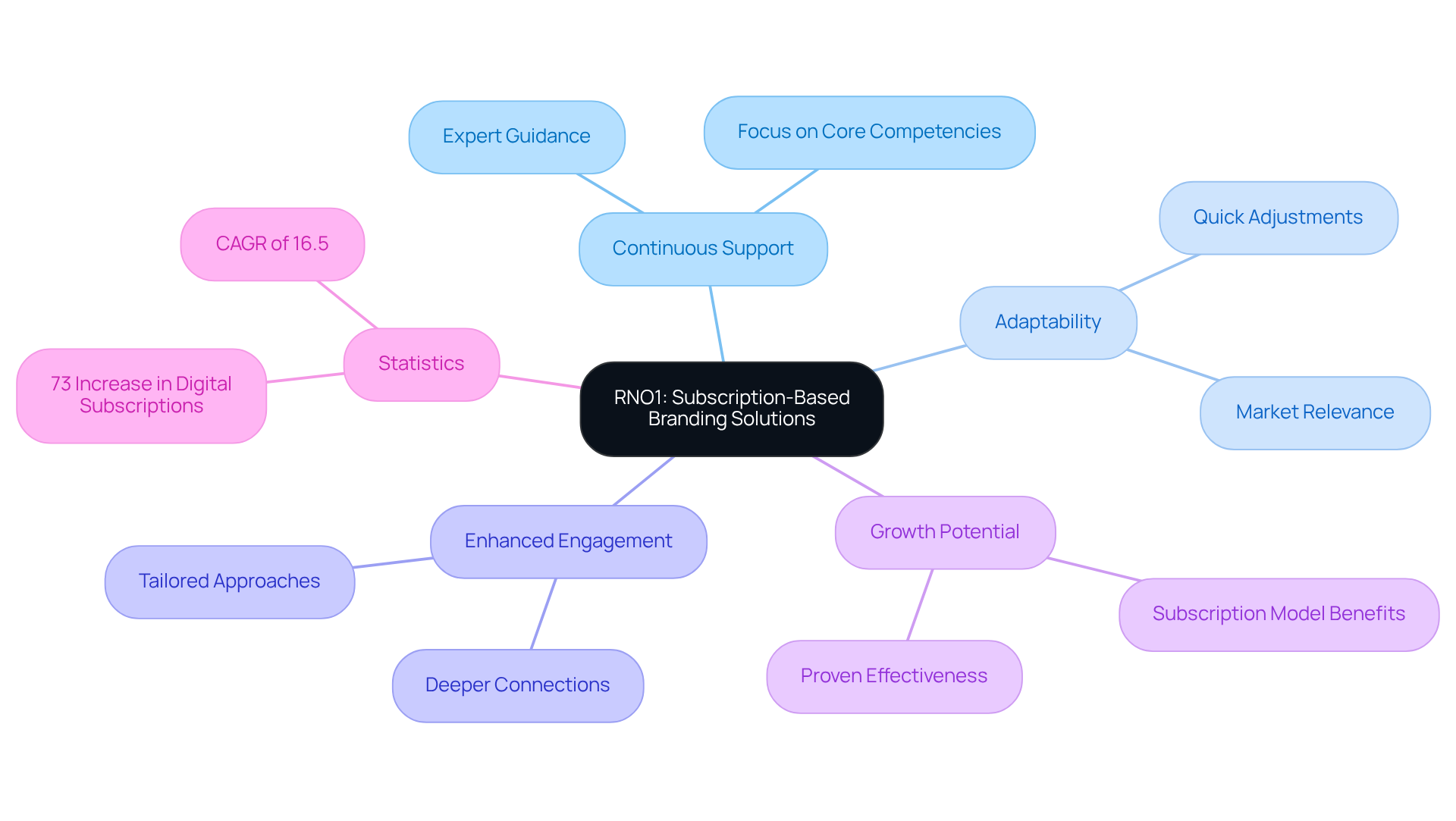
Influencer Marketing: Leveraging Social Proof for Brand Growth
In today's fast-paced digital world, technology companies often struggle to reach their target audiences and establish credibility. This challenge can feel overwhelming, especially for new businesses trying to make their mark. However, influencer marketing offers a nurturing solution, allowing these companies to connect with established audiences and gain social validation. By partnering with influencers who share their values, startups can significantly enhance their visibility and foster trust among prospective clients.
This approach not only raises awareness of the company but also encourages engagement and conversions, making it an essential strategy in modern marketing efforts. RNO1's strategic rebranding of Founder's Haven illustrates how empowering modern founders can lead to digital success, particularly through effective influencer partnerships. With over half the global population engaged on social media, the opportunities for new businesses to leverage these platforms are truly immense.
Influencer collaborations can lead to a remarkable 10% annual growth in purchases, underscoring their effectiveness in nurturing loyalty and trust. It's heartening to note that 92% of consumers trust recommendations from friends and family over any other form of advertising, and 79% trust online reviews as much as personal recommendations. As new businesses navigate the digital landscape, embracing influencer marketing becomes essential for future branding and achieving a competitive advantage.
As one insightful industry leader noted, "People trust what others have to say about a product more than they trust the company trying to sell it." This highlights the vital role of social proof in building brand credibility. RNO1's performance marketing expertise further supports this nurturing strategy, ensuring that technology enterprises can effectively scale their eCommerce efforts through targeted influencer collaborations, as demonstrated in the Founder's Haven case study. Together, we can navigate these challenges and foster a .
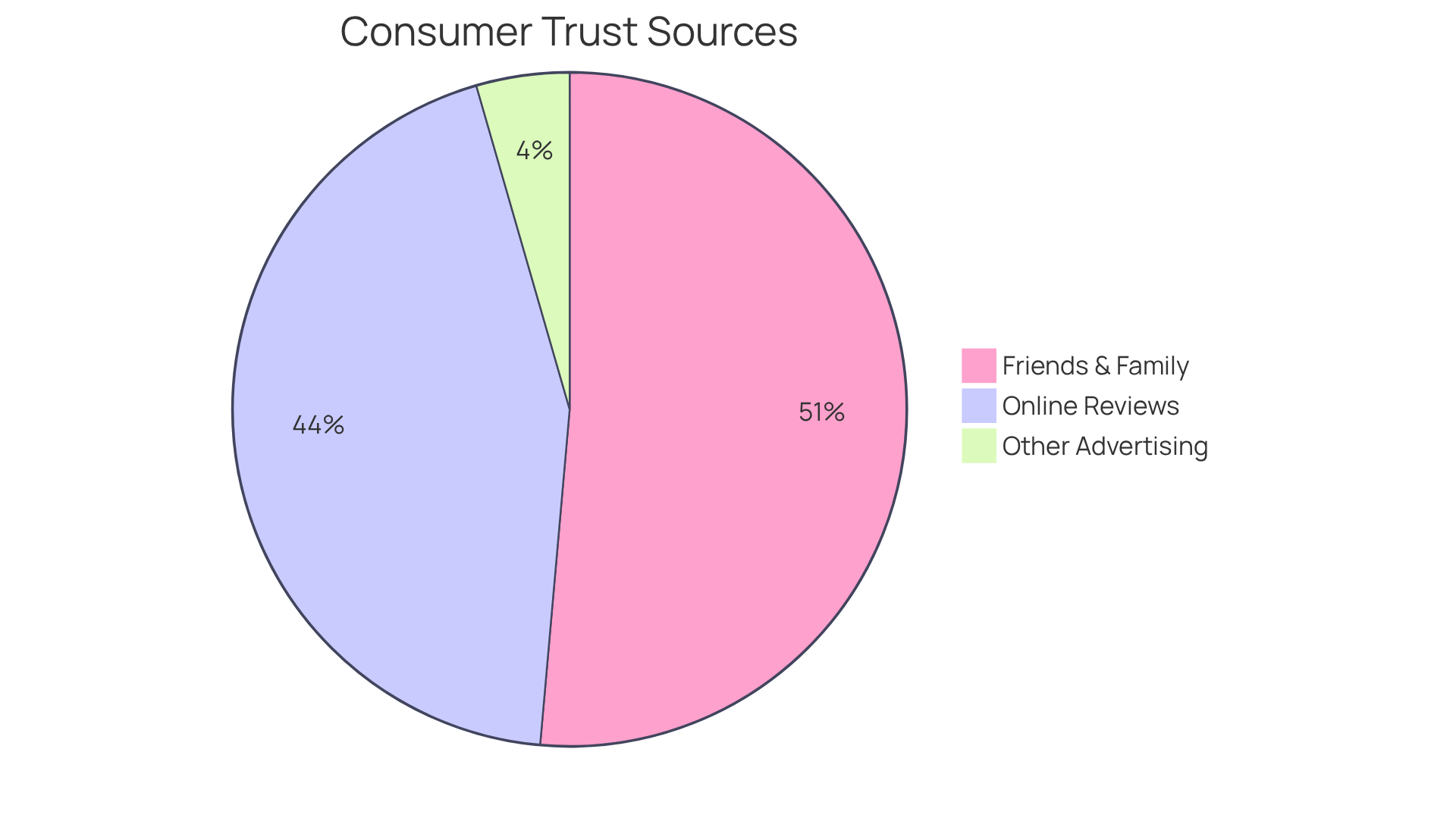
Data-Driven PR: Measuring Impact and Driving Brand Strategy
In today's fast-paced digital landscape, many tech startup founders face the daunting challenge of effectively navigating their marketing strategies. It can be overwhelming to keep up with the competition while ensuring that your brand remains visible and relevant. The pressure to make informed decisions can weigh heavily, especially when you consider the vast amount of data available. This is where comes into play, offering a nurturing solution that can guide you through these complexities.
By leveraging analytics to evaluate the impact of your marketing initiatives, you can adjust your strategies with confidence. Monitoring key metrics such as media coverage, audience engagement, and sentiment analysis allows you to make data-informed decisions that significantly enhance your brand visibility. This analytical approach not only streamlines your PR campaigns but also aligns them with your overarching business objectives, fostering a cohesive marketing strategy.
As you navigate the competitive environment, the ability to assess and adjust your marketing efforts through analytics becomes crucial for sustained growth and market relevance. In fact, the global digital PR service market is projected to reach $25.4 billion by 2032, underscoring the growing significance of data-driven PR. As Sean Lau insightfully observes, 'PR in 2025 is data-driven, digitally integrated, and rapidly evolving.' This highlights the vital role analytics play in influencing your future branding.
Moreover, the dependence on social listening tools—utilized by roughly a third of PR professionals each day—can further enhance your marketing strategies. These tools ensure that you stay attuned to your audience's feelings and market developments, allowing you to connect more deeply with your community. Remember, you are not alone in this journey; embracing data-driven PR can empower you to thrive in an ever-evolving landscape.
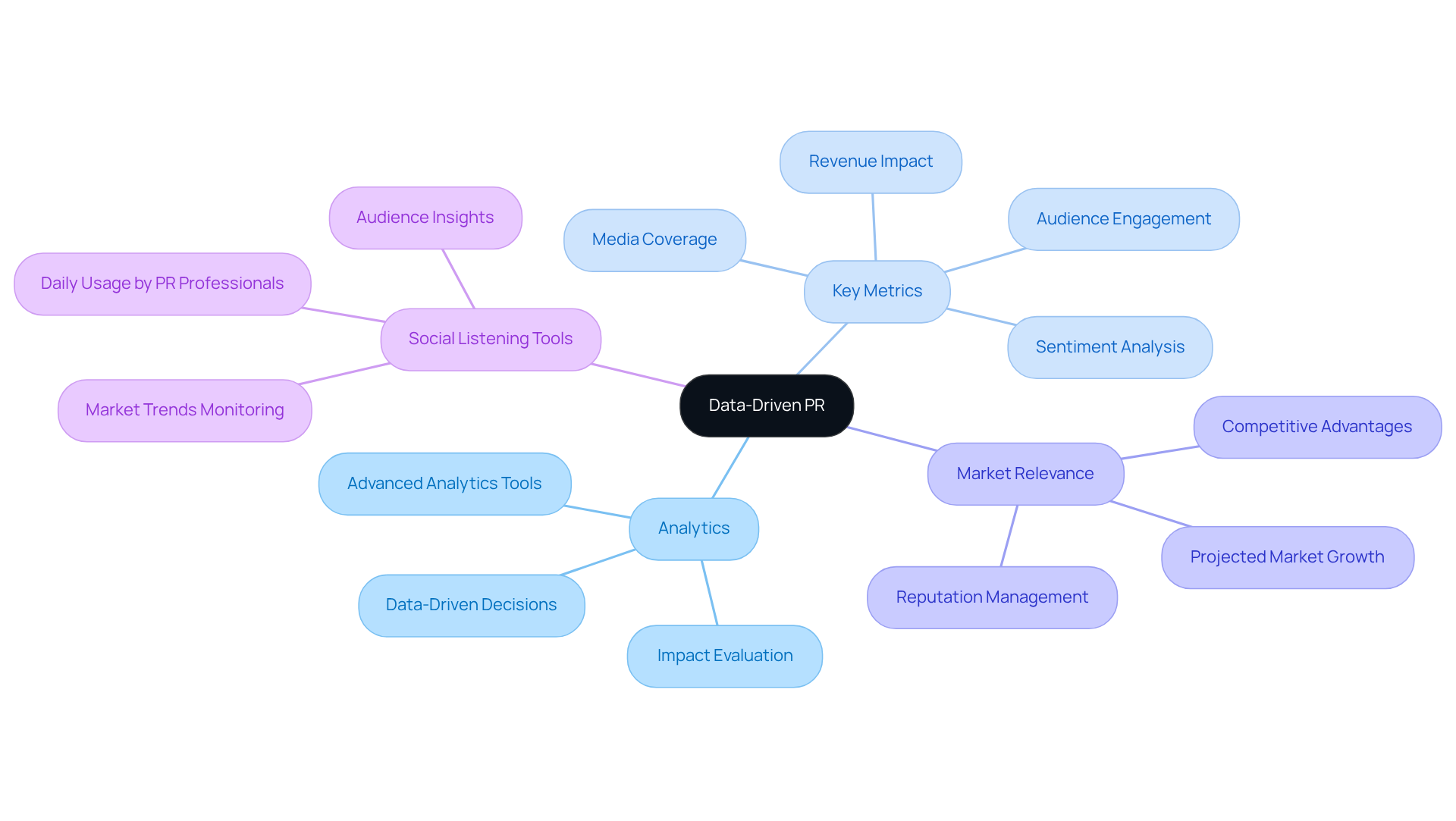
AI Integration: Automating Branding for Efficiency and Engagement
Incorporating AI into future branding strategies can be a game-changer for technology companies, offering a powerful way to enhance efficiency and engagement. Many founders face the challenge of connecting with their audience in a meaningful way. Without the right tools, it can feel overwhelming to keep up with customer expectations. This is where AI comes in. Tools like chatbots provide real-time customer support, and machine learning algorithms drive personalized marketing campaigns. By automating these processes, emerging businesses can create customized experiences that truly resonate with their audience, fostering deeper connections.
Consider this:
- 93% of marketers using AI report generating content faster, and
- 76% utilize generative AI for writing copy.
This means they can respond more agilely to market demands, which is crucial for any startup. Furthermore, AI's predictive capabilities empower brands to improve their future branding by anticipating customer preferences. In fact,
- 40% of marketers are using AI for research, enhancing insights into products, markets, brands, and customers.
As new ventures embrace these tools, they can develop effective marketing strategies that not only save time but also help build lasting relationships with their clients.
To truly maximize these benefits, technology companies should explore and personalizing marketing efforts. By doing so, they can create a nurturing environment that supports their growth and strengthens connections with their audience.
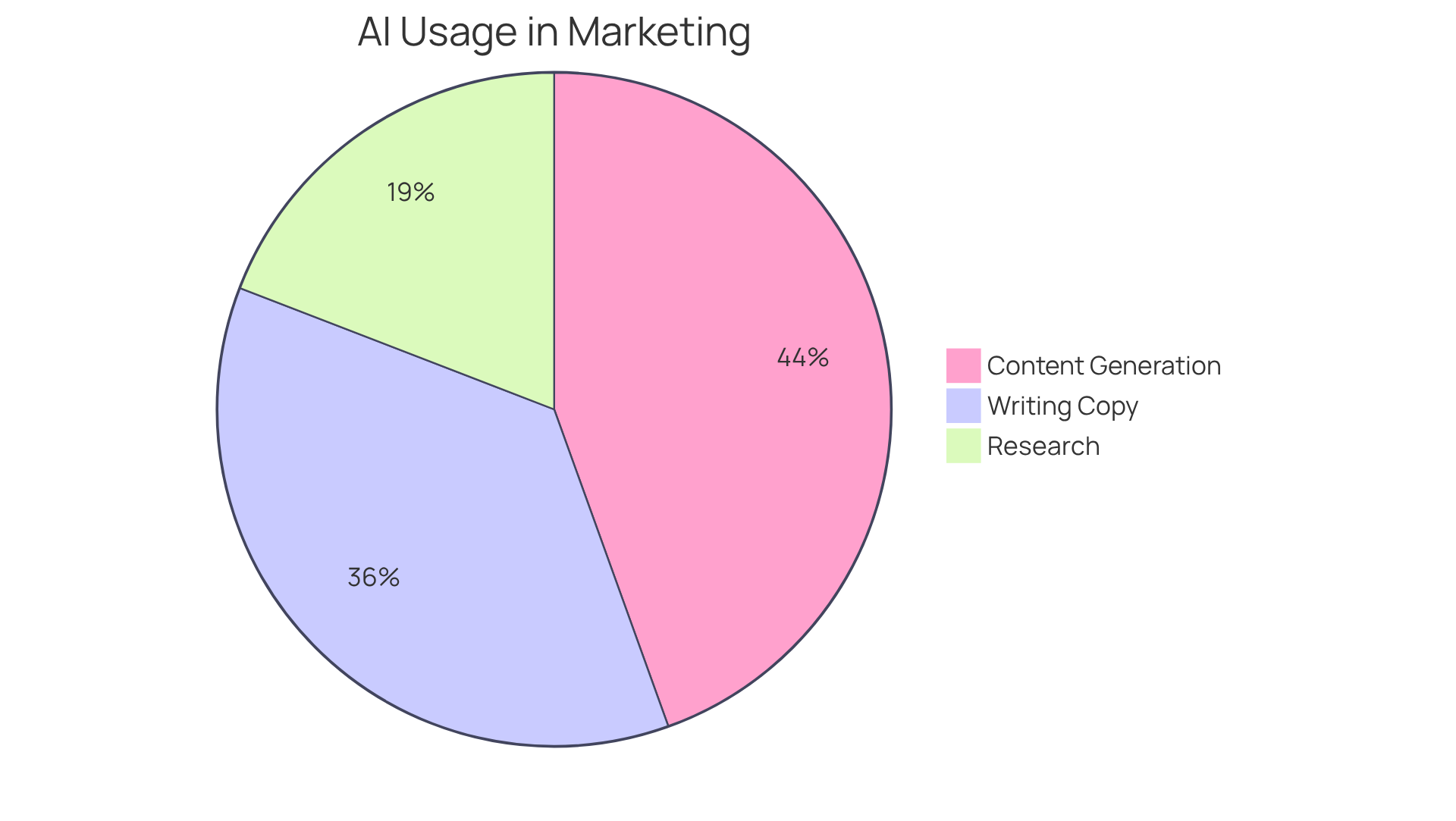
Purpose-Driven Branding: Connecting with Values for Loyalty
In today's marketplace, many technology ventures struggle to establish a genuine connection with their target audience. This disconnect can lead to missed opportunities for loyalty and engagement, especially among consumers who prioritize ethical considerations. By not aligning their identity with the values and beliefs of their audience, brands risk alienating those who seek a deeper relationship with the companies they support.
RNO1's Ryde initiative offers a nurturing solution to this challenge. By scaling omnichannel ambassador programs, it enhances e-commerce engagement through strategic influencer partnerships. This approach not only showcases a commitment to social responsibility but also invites consumers to be part of a community that shares their values. Imagine being part of a movement that emphasizes ethical practices while enjoying a seamless shopping experience.
Through the incorporation of luxury funnel messaging and the gamification of affiliate programs, technology companies can curate user-generated content that resonates deeply with their audience. National campaigns can be executed that not only amplify the brand's message but also foster a sense of belonging among advocates. This innovative strategy not only distinguishes the brand's identity but also strengthens its connection with consumers, nurturing both engagement and loyalty.
By embracing purpose-driven branding, technology ventures can cultivate a loyal community that not only supports their vision but also plays a crucial role in their future branding by actively participating in amplifying their message across various platforms. Together, we can create a marketplace where , fostering a brighter future for all.
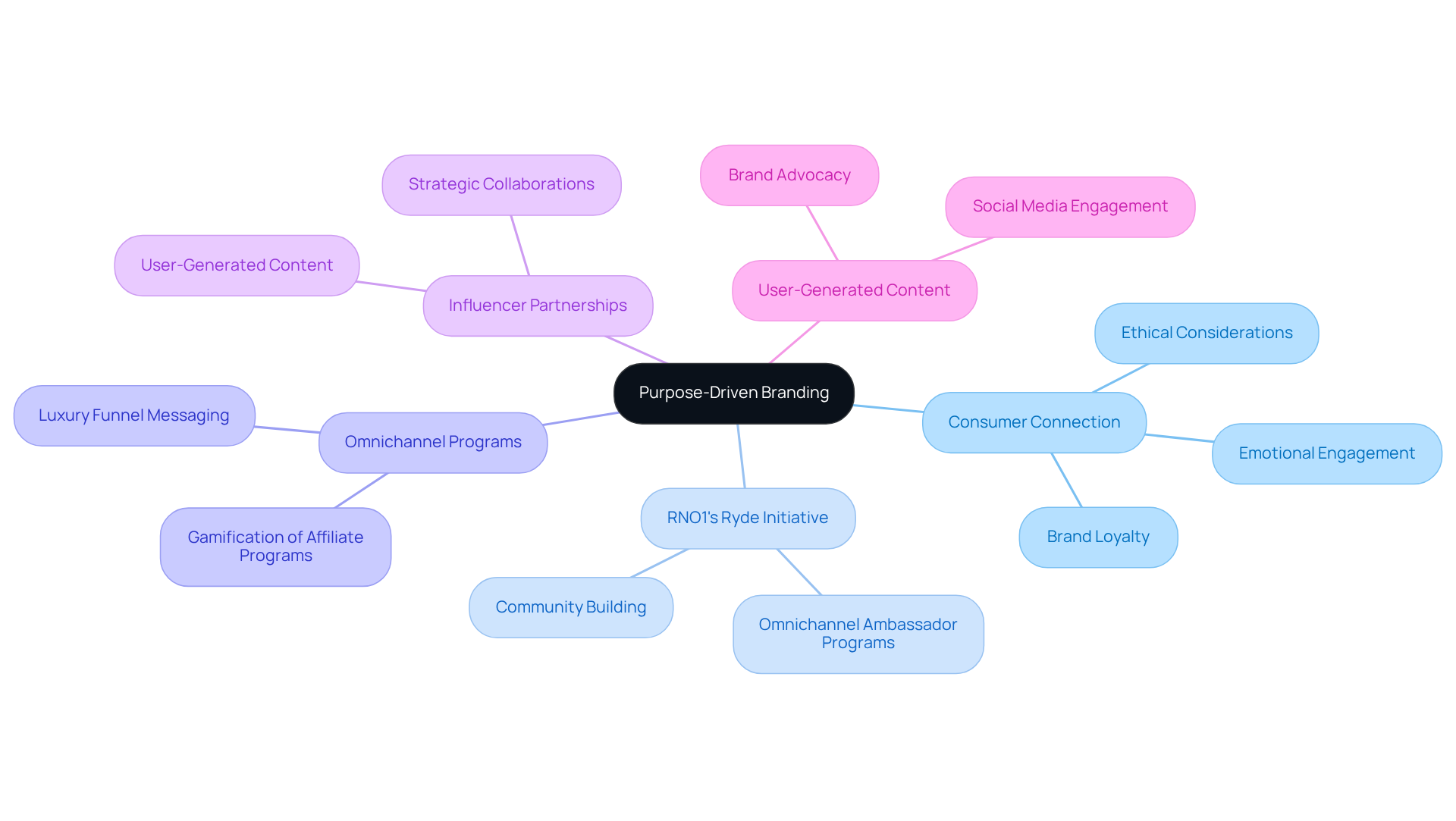
Social Media Engagement: Building Community and Brand Loyalty
For technology new ventures, the challenge of fostering a lively community around their identity can feel overwhelming. Many founders struggle to create meaningful connections with their audience, which can lead to feelings of isolation and uncertainty. However, effective social media interaction can serve as a nurturing solution.
By actively engaging with followers, sharing valuable content, and swiftly addressing feedback, new ventures can cultivate a sense of belonging among their audience. This approach not only but also amplifies word-of-mouth marketing, a crucial driver of growth in competitive environments.
Engaging with content that resonates—such as motivational quotes or user-generated stories—can significantly enhance audience interaction. In fact, studies show that posts featuring video content can increase purchase likelihood by 64%.
It’s essential to remember that a strategic mix of curated and original content can keep the community engaged, with a recommended content ratio of:
- 30% original
- 60% curated
- 10% promotional
By emphasizing community development via social media, technology companies can establish enduring connections that are vital for future branding and ongoing customer loyalty and support. Let’s nurture these relationships together, ensuring every voice is heard and valued.
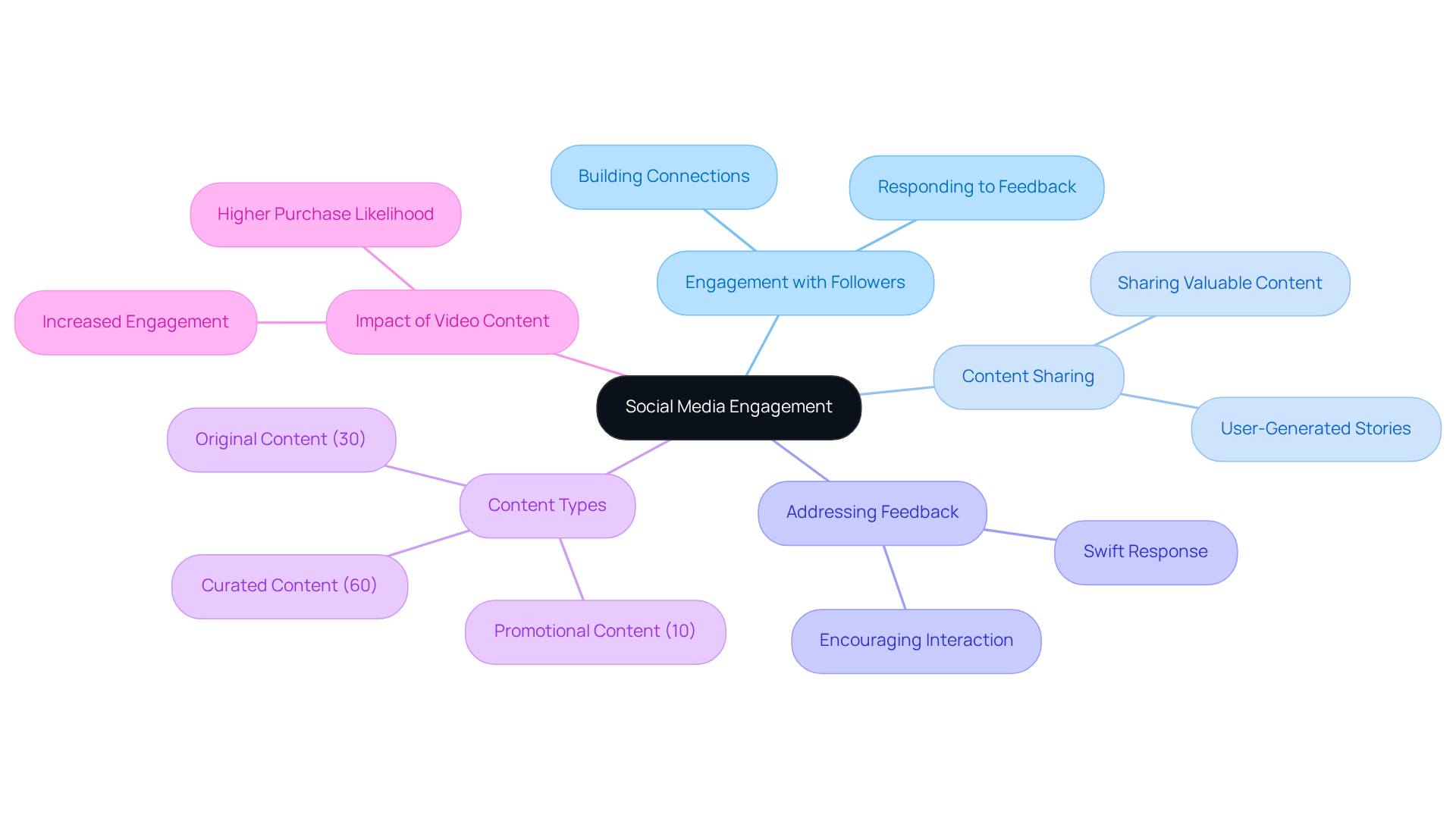
Crisis Communication: Protecting Your Brand in Real-Time
Crisis communication is essential for protecting your brand's reputation during uncertain times. For technology ventures, the challenge of navigating a crisis can feel overwhelming. This is where a proactive crisis management strategy becomes crucial. Imagine having a plan that includes:
- Clear messaging
- Designated spokespersons
- Rapid response protocols
By addressing issues transparently and swiftly, startups can mitigate potential damage and preserve trust with their audience. As Warren Buffett wisely noted, "An issue ignored is a crisis invited," highlighting the importance of taking proactive steps. Yet, crises can also lead to , offering a unique opportunity for companies to showcase their resilience. This proactive strategy not only enhances organizational resilience but also positions your company favorably for future branding in the eyes of stakeholders, paving the way for long-term success in a competitive landscape. Remember, you are not alone in this journey; together, we can navigate these challenges and emerge stronger.
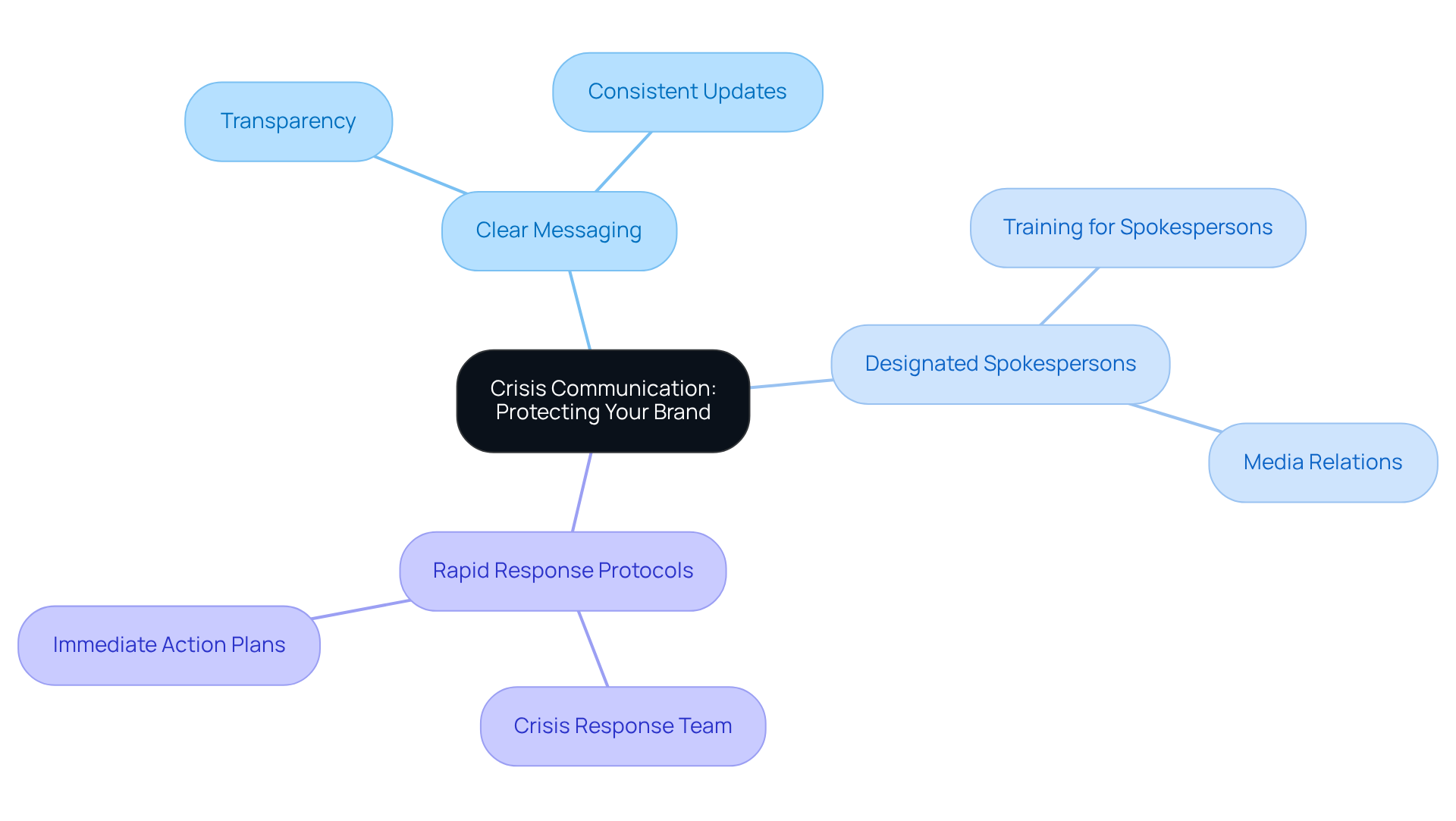
Visual Content: Enhancing Brand Messaging Through Imagery
Visual content serves as a vital resource for technology companies striving to enhance their messaging and forge meaningful connections with their audience. RNO1’s innovative approach to digital banking technology underscores the importance of investing in high-quality imagery, infographics, and videos that resonate with a company’s identity and values. Research shows that consumers are 85% more likely to make a purchase after watching a product video, illustrating the profound impact of visual storytelling on conversion rates. Furthermore, posts featuring relevant visuals garner 94% more total views than those without, highlighting the crucial role captivating imagery plays in attracting attention. Additionally, visuals yield 650% higher engagement than text-only posts, further emphasizing their effectiveness in engaging audiences.
To create impactful imagery, new ventures should prioritize authenticity and relevance. Take, for instance, Airbnb’s use of vibrant, high-quality photos that showcase the diversity of its offerings, fostering a deeper connection with potential customers. This aligns seamlessly with case studies that demonstrate how effective imagery can enhance customer engagement. Moreover, incorporating infographics can simplify complex information, making it more digestible and engaging, which can lead to a 12% increase in website traffic.
Expert opinions suggest that a consistent visual identity enhances recognition and trust. By establishing a distinctive imagery style that resonates with the target audience, startups can convey their values more effectively. This nurturing approach not only enriches messaging but also cultivates customer loyalty, as 73% of consumers are more inclined to purchase from companies that utilize high-quality images.
In the competitive landscape of technology marketing, successful companies leverage visual content to set themselves apart. Brands like Spotify and Nike exemplify this by employing unique imagery and symbols that bolster their messages. By prioritizing visual content, technology companies can create lasting impressions and foster engagement, ultimately paving the way for future branding in the digital marketplace, in line with RNO1’s commitment to innovative identity and digital experiences. Additionally, technology company founders are encouraged to adopt a visual content strategy that includes regular updates of high-quality images and videos, ensuring their brand remains relevant and captivating in the ever-evolving digital landscape.
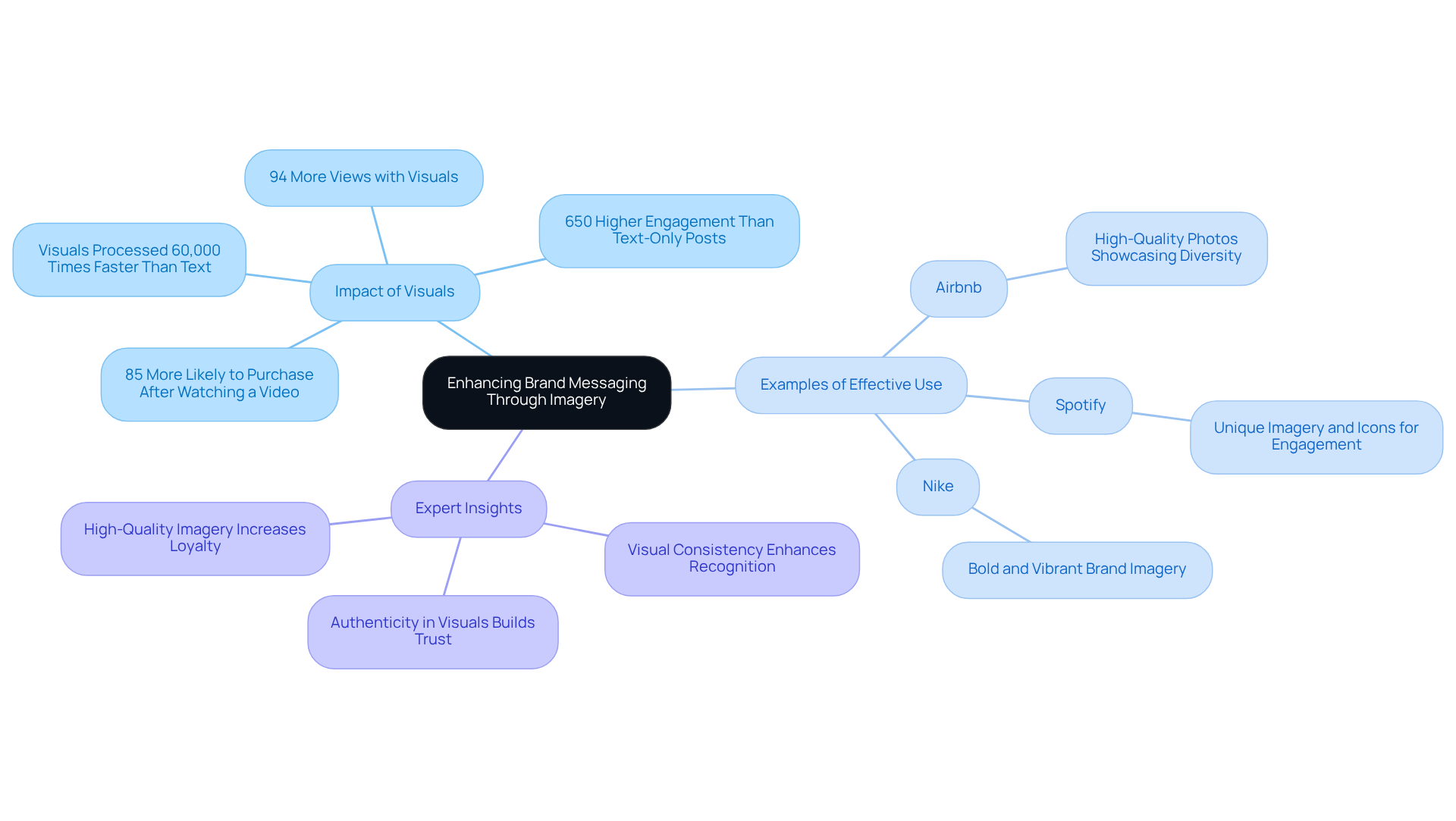
Experiential Branding: Creating Memorable Customer Interactions
Experiential branding presents a challenge for many startups: how to create memorable interactions that truly resonate with customers. In the fast-paced world of technology, this challenge can often feel overwhelming. Immersive experiences, like engaging events, innovative pop-up shops, or interactive online campaigns, are essential for building those connections. When startups prioritize customer experience, they cultivate that can significantly enhance loyalty and advocacy for their products.
Consider this: emotionally engaged customers are at least three times more likely to repurchase from a company and show less price sensitivity. This highlights the importance of creating impactful experiences that touch the heart. Successful tech brands, such as IKEA, have embraced immersive strategies—like their use of augmented reality (AR) technology—to transform customer interactions, making them more engaging and personalized.
As we navigate an evolving landscape, it’s crucial to recognize that 65% of customers expect businesses to adapt to their changing needs and preferences. For new enterprises, investing in memorable experiences is not just a differentiator; it's essential for future branding and forging lasting relationships with their audience. By fostering these connections, startups can drive growth and success in a competitive market, creating a nurturing environment where both customers and businesses thrive together.
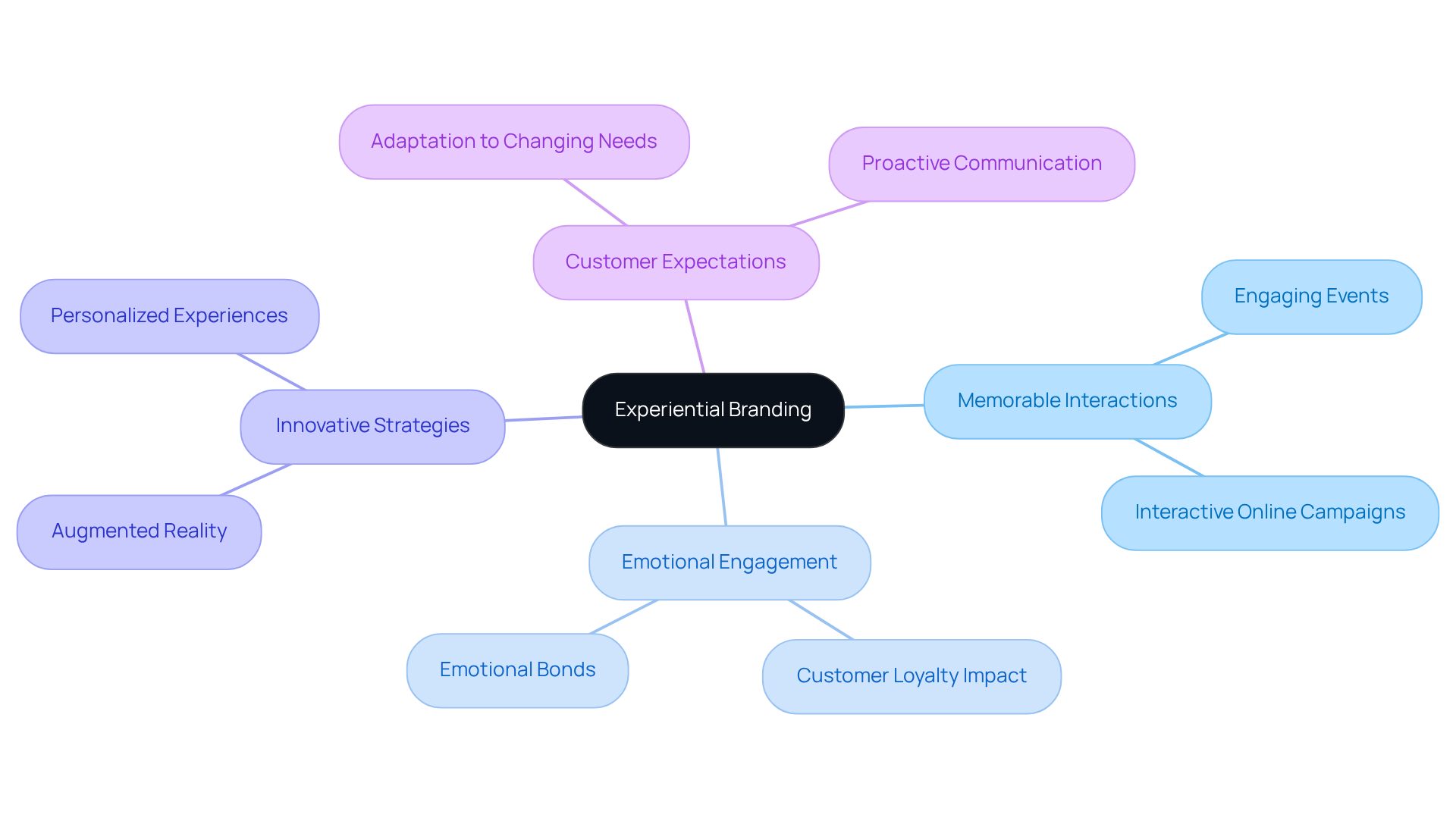
Sustainable Branding: Differentiating Through Eco-Friendly Practices
Sustainable branding is becoming a crucial focus for future branding as consumers increasingly prioritize environmental consciousness. For technology ventures, embracing eco-friendly practices—such as sustainable sourcing, waste reduction, and social responsibility—can be a significant differentiator in a competitive market. It's heartening to know that research indicates 73% of Gen Z shoppers are willing to pay extra for sustainable products, showcasing a clear consumer preference for brands that align with ethical values. Additionally, 62% of Gen Z consumers prefer to shop from eco-friendly companies, underscoring the importance for startups to weave sustainability into their core operations. By doing so, they can foster a loyal customer base that not only appreciates these efforts but also contributes to growth and success.
Successful eco-friendly branding strategies in the tech industry often involve collaborations that enhance sustainability efforts. A notable example is the partnership between Allbirds and Adidas, which co-created a shoe with a low carbon footprint. Such collaborations can inspire consumers to make eco-conscious choices and bolster company credibility. Moreover, companies that effectively communicate their sustainability initiatives—through clear messaging and engaging marketing—are more likely to resonate with consumers. In fact, 84% of customers report feeling disconnected by insufficient environmental practices.
For new ventures, establishing a strong commitment to future branding transcends mere compliance; it’s about crafting an identity that embodies a dedication to environmental stewardship. This approach not only sets them apart from competitors but also positions them favorably in the eyes of consumers who are increasingly evaluating . Furthermore, with 51% of employees wishing to minimize their organization's environmental footprint, adopting sustainable practices can also enhance employee engagement and satisfaction. As the market evolves, tech startups that prioritize future branding in an eco-friendly manner will not only meet consumer expectations but also lay the groundwork for long-term success.
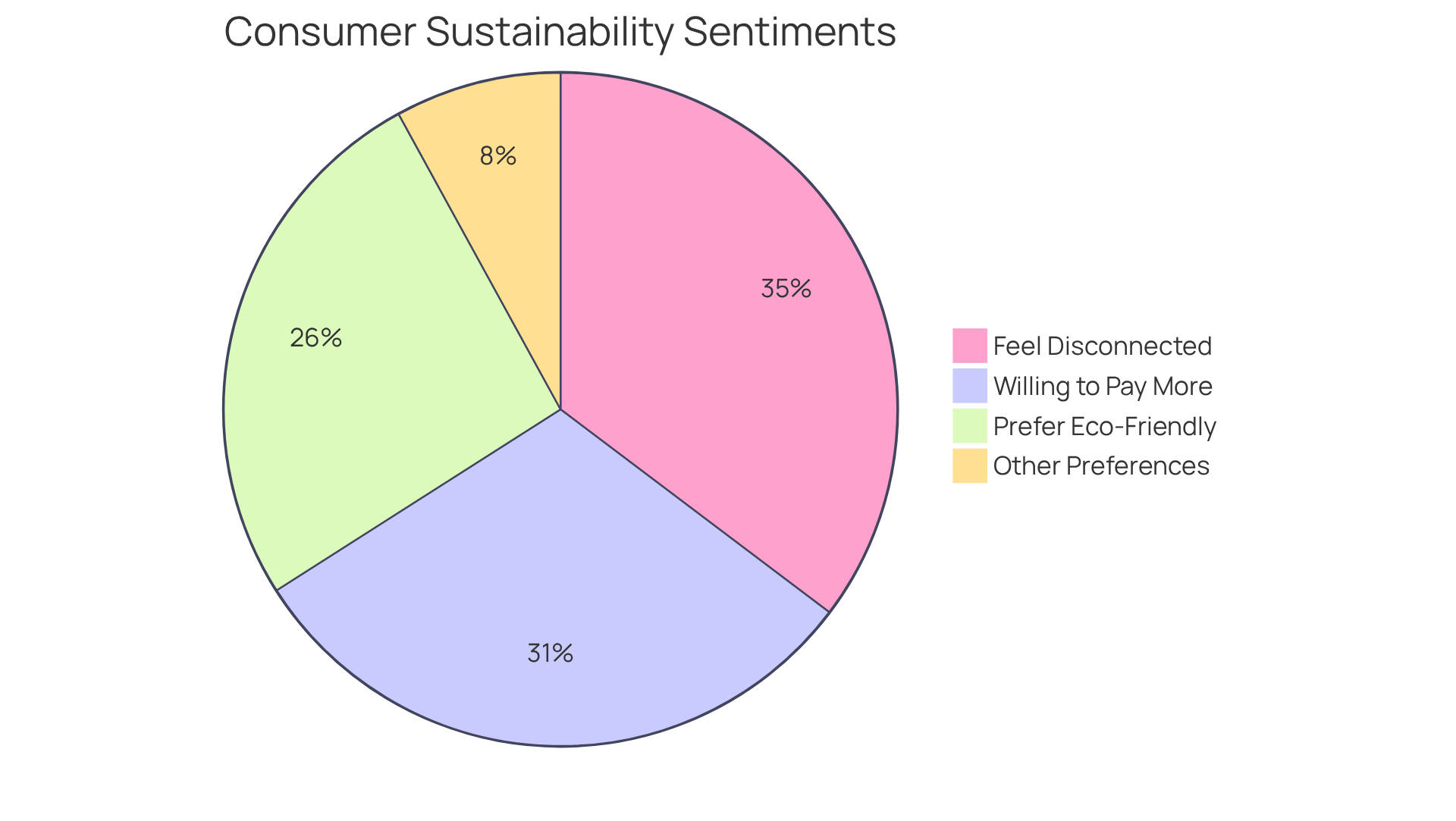
Conclusion
Embracing future branding trends is essential for tech startups striving to thrive in a competitive landscape. Many founders face the daunting challenge of distinguishing their brand in a crowded market. This article highlights how innovative strategies, such as:
- Subscription-based branding solutions
- Influencer marketing
- Data-driven PR
- AI integration
- Purpose-driven branding
can significantly enhance a startup's identity and foster customer engagement. By adopting these approaches, startups can navigate the complexities of the market and cultivate meaningful connections with their audience.
Key insights discussed include:
- The effectiveness of subscription models in providing ongoing support and adaptability
- The power of influencer partnerships to build social proof and trust
- The critical role of data analytics in shaping informed marketing strategies
Additionally, the importance of visual content and experiential branding in creating memorable customer interactions cannot be overstated. These elements play a vital role in establishing loyalty and advocacy, which are crucial for long-term success.
As the market continues to evolve, tech startups are encouraged to proactively embrace these trends. By integrating sustainable practices and focusing on customer experience, brands can differentiate themselves and build lasting relationships with their audience. The future of branding lies in the ability to connect authentically with consumers. Those who embrace these strategies will not only navigate challenges but also position themselves for success in the years to come. Remember, you are not alone in this journey; together, we can foster a community that thrives on innovation and connection.
Frequently Asked Questions
What is RNO1 and how does it help tech startups?
RNO1 offers subscription-based identity solutions that provide continuous support and expertise for tech startups, helping them navigate market complexities and establish a strong brand identity without the need for extensive internal teams.
What innovative services does RNO1 provide?
RNO1 provides services such as Revolve, Retrn, and Ryde, which help ensure that a startup's identity evolves alongside its growth journey, enhancing digital presence and customer engagement.
What are the key benefits of RNO1's subscription-based solutions?
The key benefits include continuous support from experts, adaptability to market changes, enhanced audience engagement, and leveraging subscription models for business growth.
How effective are subscription models for tech startups?
Subscription models have shown a compound annual growth rate (CAGR) of 16.5%, and 73% of digital leaders reported an increase in digital subscriptions in 2023, highlighting their effectiveness for tech startups.
What role does influencer marketing play for tech companies?
Influencer marketing allows tech companies to connect with established audiences, gain social validation, and enhance visibility, making it an essential strategy for building credibility and fostering engagement.
How does influencer marketing impact brand growth?
Influencer collaborations can lead to a 10% annual growth in purchases, and a significant majority of consumers trust recommendations from friends and family, underscoring the effectiveness of social proof in brand growth.
What is data-driven PR and why is it important for tech startups?
Data-driven PR involves using analytics to evaluate the impact of marketing initiatives, allowing startups to make informed decisions and adjust strategies for enhanced brand visibility and relevance in a competitive landscape.
What are the projected trends for the digital PR service market?
The global digital PR service market is projected to reach $25.4 billion by 2032, indicating the growing significance of data-driven approaches in public relations.
How can social listening tools benefit PR strategies?
Social listening tools help PR professionals stay attuned to audience sentiments and market developments, allowing for deeper connections with the community and more effective marketing strategies.




